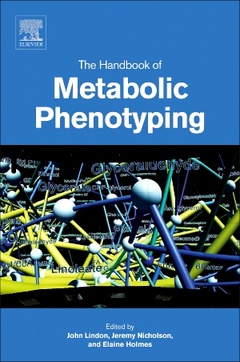The Handbook of Metabolic Phenotyping
Coordonnateurs : Lindon John C., Nicholson Jeremy K., Holmes Elaine

The Handbook of Metabolic Phenotyping is the definitive work on the rapidly developing subject of metabolic phenotyping. It explores in detail the wide array of analytical chemistry and statistical modeling techniques used in the field, coupled with surveys of the various application areas in human development, nutrition, disease, therapy, and epidemiology to create a comprehensive exploration of the area of study. It covers recent studies that integrate the various -omics data sets to derive a systems biology view. It also addresses current issues on standardization, assay and statistics validation, and data storage and sharing. Written by experts with many years of practice in the field who pioneered many of the approaches widely used today, The Handbook of Metabolic Phenotyping is a valuable resource for postgrads and research scientists studying and furthering the field of metabolomics.
1. An Overview of Metabolic Phenotyping and Its Role in Systems Biology
2. NMR Spectroscopy Methods in Metabolic Phenotyping
3. The Role of Ultra Performance Liquid Chromatography-Mass Spectrometry in Metabolic Phenotyping
4. GC-MS-Based Metabolic Phenotyping
5. Metabolic Phenotyping Using Capillary Electrophoresis Mass Spectrometry
6. Supercritical Fluid Chromatography for Metabolic Phenotyping: Potential and Applications
7. The iKnife: Development and Clinical Applications of Rapid Evaporative Ionization Mass Spectrometry
8. Univariate Statistical Modeling, Multiple Testing Correction, and Visualization in Metabolome-Wide Association Studies
9. Multivariate Statistical Methods for Metabolic Phenotyping
10. Data-Driven Visualizations in Metabolic Phenotyping
11. Big Data and Databases for Metabolic Phenotyping
12. Progress in Standardization of Metabolic Phenotyping Data
13. Conception, Implementation and Operation of Large-Scale Metabolic Phenotyping Centres: Phenome Centres
14. Applications of Metabolic Phenotyping in Pharmaceutical Research and Development
15. Metabolic Phenotyping in Nutrition Research
16. Metabolic Phenotyping in Clinical Practice
17. Applications of Metabolic Phenotyping in Epidemiology
18. Influence of the Human Gut Microbiome on the Metabolic Phenotype
19. Linking Metabolic Phenotyping and Genomic Information
20. Metabolic Phenotyping: History, Status, and Prospects
For postgraduate and professional research scientists working in the field of analytical chemistry, biochemistry, drug discovery and development in pharmaceutical companies, or working in related industries such as agriculture and plant biochemistry, forensic science, environmental monitoring, etc.
Dr. Jeremy K. Nicholson is the head of the Department of Surgery and Cancer at Imperial College London and has held honorary professorships at six universities. Additionally, he held two professorships at the Chinese Academy of Sciences, of which he was elected as an Albert Einstein Honorary Professor in 2014. He is also a founder, director, chief scientist, and chief scientist officer at Metabometrix Ltd. His research interests include spectroscopic and chemometric approaches to the investigation of disturbed metabolic processes in complex organisms.
Dr. Elaine Holmes is the head of the Division of Computational and Systems Medicine and a professor of chemical biology in the Department of Surgery and Cancer at Imperial College London. She has over 20 years of experience in metabonomic technology and its applications. Her focus is on the discovery and development of metabolic biomarkers of disease in personalized health-care and population studies with significant contributions to cardiovascular, neuroscience, and infectious disease research. Recently, Prof. Holmes has driven large-scale profiling efforts defining the concept of the metabolome-wide association study (MWAS) in molecular epidemiology, specifically exploring the link between hypertension, diet, and metabolic profiles.
- Contains theoretical and practical explanations of all the main analytical chemistry techniques used in metabolic phenotyping
- Explores, in detail, the many diverse statistical approaches used in the field
- Offers practical tips for successfully conducting metabolic phenotyping studies
- Features reviews of all of the various fields of activity relating to human studies
Date de parution : 10-2018
Ouvrage de 619 p.
15x22.8 cm
Thèmes de The Handbook of Metabolic Phenotyping :
Mots-clés :
Attrition; Big data; Bile acids; Bioanalysis; Biomarker; Biomarkers; Brain tumor; Breast cancer; Cancer; Cardiovascular; CE-MS; Chemometrics; Chemometrics (data fusion; linear algebra); Clinical medicine; Clinical trials; Cloud computing; Data; Data processing; Data standards; Databases; Derivatization; Diagnosis; Dietary biomarkers; Diffusion; Disease; Drug development; Drug discovery; Drug efficacy; Drug safety; Drug toxicity; Effective number of tests; ELSI; Endoscopy; Epidemiology; Ethical; Expression quantitative trail loci (eQTL); Fermentation; Gastroenterology; Gastrointestinal tract; GC-MS; Generalized linear models; Genome-wide association studies (GWAS); Genomics; Graphics; Graphs; High-performance computing; HILIC; HSQC; Hyperpolarization; Internal validation; J-resolved; Large scale; Legal; Lipids; Machine learning; Mass spectrometry; Metabolic fingerprinting; Metabolic phenotyping; Metabolic profiling; Metabolite identification; Metabolome-wide association studies; Metabolomics; Metabolomics metabonomics; MetabolomicsMetabolic phenotyping; Metabonomics; Metadata; Methylamines; Microbiology; Microbiomics; Microbiota; MS; Multiple testing correction; Multivariate statistics; NMR; NMR spectroscopy; Nonuniform sampling; Nutrition; -Omics; Omics data; Orbitrap; Pattern recognition; Personalized medicine; Pharmaceuticals; Pharmacometabonomics; Phenome; PhenoMeNal; Phytochemicals; Please check the that the copyeditor has assigned; and correct if necessary.-->; Metabolomics; Plots; Precision nutrition; Preprocessing; Prognosis; Proteins; PSYCHE; Pure shift; Q-TOF; Quality control; Quantitation; Rapid evaporative ionization; Real-time; Reversed-phase; Sample preparation; SFC; Short-chain fatty acids; Social implications; Software tools; Standards; Statistical spectroscopy; Stratification; Stratified medicine; Surgery; Target discovery; TOCSY; Toxicity; UPLC-MS; Visualization
